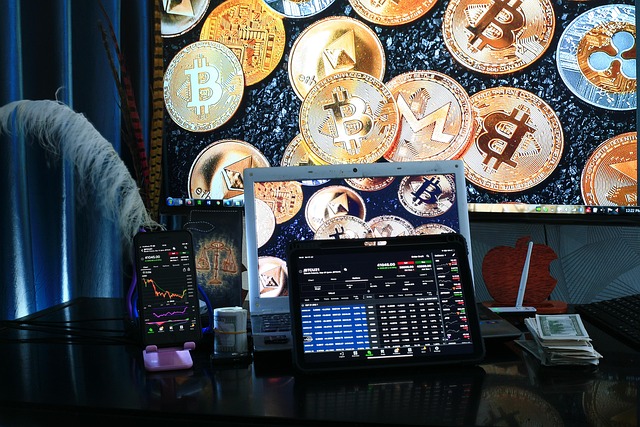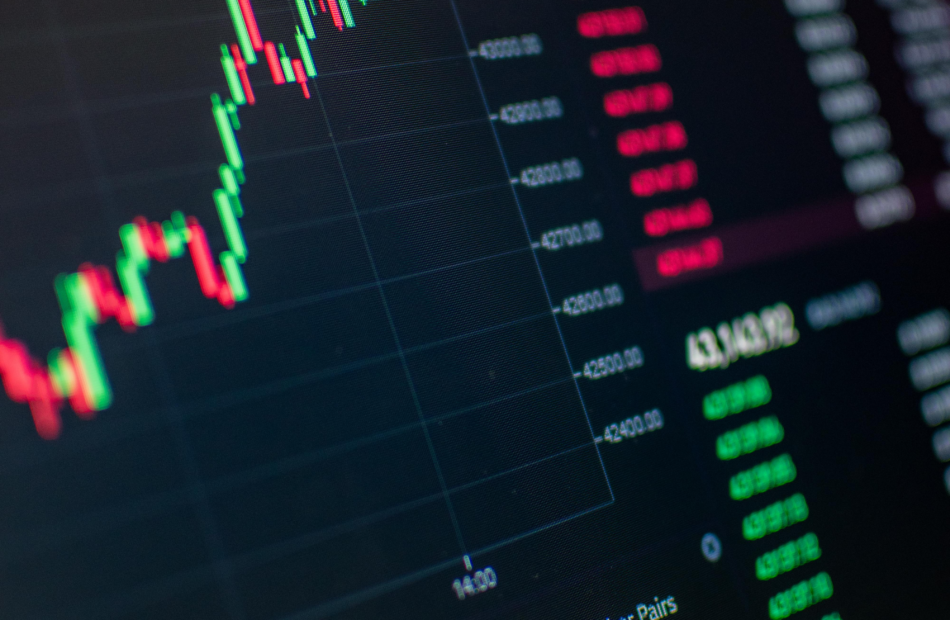$2T fake tariff news pump shows ‘market is ready to ape’
Recent fake news that US President Donald Trump was considering a 90-day pause in tariffs shows the potential for a strong market rebound should a real one take place, according to observers. A fake news post on X on April 7 from the verified “Walter Bloomberg” account claimed that the White House was considering a 90-day pause on tariffs following an interview with Kevin Hassett, one of Donald Trump’s economic advisers. “Hassett: Trump is considering a 90-day pause in tariffs for all countries except China,” read the now-deleted post from the user, who is not affiliated with Bloomberg News. The account, which has a verified badge and 852,000 followers, caused quite a stir after the rumor was mistakenly aired as a banner on CNBC and then amplified by Reuters.The S&P 500 spiked more than 8% from its low on the day in reaction, the Nasdaq added 9.5% in less than an hour and the Dow Jones pumped 7%, adding trillions to stock markets. Bitcoin (BTC) prices saw a similar spike, with the asset pumping 6.5% to top $80,000 briefly before falling back again. The official White House “Rapid Response” account quickly posted on X that this was fake news, and markets began to dump again. “Market ready to ape” at a moment’s noticeWhile the rumor was debunked as fake, crypto YouTuber Lark Davis said that the episode revealed some critical things about the market. The market is ready to accept prolonged China negotiations as long as most deals can be resolved, he said before adding the “market is ready to ape, even a lame 90-day delay sent markets soaring.” “Now imagine what happens when dozens of deals are made with top players ie, India, Canada, and the UK. Shit tons of money is on the sidelines, ready to ape in at a moment’s notice.”“That fake headline might actually give Trump, Navarro, and Lutnick more confidence to keep pushing this further,” commented X user Geiger Capital, who added, “They now know that at any point they can announce a pause and the market will rally ~10% in a single day.”What really happened in Hasset interviewFox News asked Hasset whether Trump would consider a 90-day pause in tariffs and was given a non-committal response. “I think the president is gonna decide what the president is gonna decide,” he said, adding: “Even if you think there will be some negative effect from the trade side, that’s still a small share of GDP.” Related: Billionaire investor would ‘not be surprised’ if Trump postpones tariffs“The idea that it’s going to be a nuclear winter or something like that is completely irresponsible rhetoric,” he said. KILMEADE: Would Trump consider a 90 days pause in tariffs?HASSETT: I think the president is gonna decide what the president is gonna decide … even if you think there will be some negative effect from the trade side, that’s still a small share of GDP pic.twitter.com/3KymvgOwQG— Aaron Rupar (@atrupar) April 7, 2025Shortly after the 90-day tariff pause post was deleted, Trump took to his own social media platform, Truth Social, to threaten China with even more tariffs. “If China does not withdraw its 34% increase above their already long-term trading abuses by tomorrow, April 8th, the United States will impose additional tariffs on China of 50%, effective April 9th,” he said. Magazine: Financial nihilism in crypto is over — It’s time to dream big again
SEC crypto trading roundtable to include crypto giants Uniswap, Coinbase
The US Securities and Exchange Commission has released the list of executives from US crypto and finance giants that will take part in a roundtable discussion on crypto trading regulation.On April 7, the regulator said its upcoming April 11 roundtable will discuss how it should handle crypto trading rules, calling it “Between a Block and a Hard Place: Tailoring Regulation for Crypto Trading.”It will be the second in a series of discussions on crypto, headed by its recently-formed Crypto Task Force.Taking part are Uniswap Labs chief legal officer Katherine Minarik, Cumberland DRW associate general counsel Chelsea Pizzola and Coinbase institutional product vice president Gregory Tusar — all firms that had once been in the regulator’s scope.Under the Biden administration, the regulator sued Cumberland DRW in October and Coinbase in June 2023 for alleged securities law violations, but both lawsuits were dropped this year under the Trump administration.The SEC also started an investigation for possible enforcement action into Uniswap Labs in April 2024, which was dropped in February with no further action.Also taking part in the roundtable are New York Stock Exchange product chief Jon Herrick, crypto brokerage FalconX business lead Austin Reid, securities tokenizing firm Texture Capital CEO Richard Johnson and the University of California, Berkeley finance chair Christine Parlour.Source: SECDave Lauer, co-founder of the advocacy group We the Investors and Tyler Gellasch, CEO of the not-for-profit Healthy Markets Association, will also take part, while law firm Goodwin Procter partner Nicholas Losurdo will moderate the discussion.Representing the SEC will be acting chair Mark Uyeda, Crypto Task Force chief of staff Richard Gabbert and Commissioners Caroline Crenshaw and Hester Peirce.The roundtable is the second crypto-focused discussion in a series of five that the SEC dubbed the “Spring Sprint Toward Crypto Clarity.” The first was on March 21, regarding the legal status of crypto, while three future discussions will cover custody, tokenization, and decentralized finance (DeFi).SEC’s Uyeda orders review of staff crypto commentsThe roundtables come as the SEC, under President Donald Trump, works to revamp its oversight of the crypto industry, with its latest action being to review staff statements on crypto so they can possibly be changed or withdrawn.Uyeda said in an April 5 statement shared by the SEC on X that due to Trump’s executive order on deregulation and recommendations from the Elon Musk-led Department of Government Efficiency, or DOGE, he was reviewing seven staff statements, five of which concerned crypto.Source: SEC“The purpose of this review is to identify staff statements that should be modified or rescinded consistent with current agency priorities,” Uyeda said.Related: SEC paints ‘a distorted picture’ of USD stablecoin market — Crenshaw The first on the list was an April 2019 analysis from the Strategic Hub for Innovation and Financial Technology on how crypto sales could be investment contracts under the securities defining Howey test — an argument the agency had made to sue multiple crypto firms for legal violations.Also up for review are two Division of Investment Management statements, one from May 2021 asking investors to consider the risks of funds with exposure to Bitcoin futures and a November 2020 statement asking for feedback on whether state-chartered banks meet standards to be qualified custodians.The SEC will also look into a December 2022 Division of Corporation Finance statement that urged SEC-regulated companies to evaluate their disclosures to mention if a slew of crypto firm bankruptcies and collapses at the time impacted their business.Finally, the agency will review a Division of Examinations alert from February 2021 that said, “a number of activities related to the offer, sale and trading of digital assets that are securities present unique risks to investors.” Legal Panel: XRP win leaves Ripple a ‘bad actor’ with no crypto legal precedent set
Spanish police arrest six over $20M AI-powered investment scam
Authorities in Spain have arrested six people who helped operate a global AI-powered investment scam that stole over $20 million from at least 208 victims. The scammers would swindle victims up to three times. After stealing an initial sum through the investment scam, the fraudsters contacted victims twice more, masquerading as investment managers and then as authorities, offering to recover the stolen funds for a fee, Spanish police said in an April 7 statement. The scammers used deepfake ads of “national personalities” promising high returns on crypto investments, and would occasionally pose as financial advisers or even feign romantic interest to lure in victims. Experts have been warning of a rise in AI-enhanced scams. Blockchain analytics firm Chainalysis said in its Feb. 13 Crypto Scam Revenue 2024 report that generative AI is making “scams more scalable and affordable for bad actors to conduct.”🚩Detenidas seis personas por estafar más de 19 millones de euros usando #inteligenciaartificial🔴Engañaban a las víctimas a través de anuncios manipulados con #IA para que realizaran inversiones con #criptomonedas en productos supuestamente muy rentables pic.twitter.com/rMrdgBpOYz— Policía Nacional (@policia) April 7, 2025“Victims were not selected randomly; instead, algorithms selected those whose profiles matched the cybercriminals’ searches,” Spanish police said.“Once they selected their victims, they placed advertising campaigns on the websites or social networks they used, offering them cryptocurrency investments with high returns and zero risk of asset loss — investments that, obviously, turned out to be a scam.” When victims could not withdraw the funds, most realized it was a scam, according to Spanish police; however, the ruse didn’t end there. Scammers would trick victims again with follow-up scamsThe cybercriminals would then contact victims again, posing as investment managers, claiming the stolen funds were frozen and could be recovered if they paid a deposit. “The victims, hoping to finally recover their money, made the deposit without realizing they had been scammed again,” Spanish police said.The scammers would then contact victims a third time, this time posing as Europol agents or lawyers from the United Kingdom, offering to return the stolen funds if the victim paid the corresponding taxes in the country where it was blocked.Related: Crypto broker breaks ankles while fleeing kidnappers in SpainSpanish authorities arrested six people involved in the syndicate, charging them with fraud, money laundering and falsifying documents in a criminal organization. During a raid on the alleged leader behind the scam, Spanish authorities seized numerous cell phones, computers, hard drives, a simulated weapon and extensive documentation. Several people linked to the plot have also been identified in other countries, and the syndicate allegedly created a large number of fake companies to channel the stolen funds. “Furthermore, the members of the organization used multiple false identities. In the case of the leader, for example, he used more than 50 different identities,” Spanish police said.Magazine: Bitcoin heading to $70K soon? Crypto baller funds SpaceX flight: Hodler’s Digest, March 30 – April 5
Lawyer sues US homeland dept to probe supposed Satoshi Nakamoto meeting
A crypto lawyer has sued the US Department of Homeland Security, alleging the agency may know who created Bitcoin — compelling the department to share what it knows. The Freedom of Information Act lawsuit was filed by James Murphy, who based his accusations on claims made by DHS Special Agent Rana Saoud at a conference in April 2019, where she said a few of her colleagues had previously met with four people involved in creating Bitcoin.“My FOIA lawsuit simply asks for the notes, email and other documents relating to that alleged interview,” Murphy posted to X after announcing the April 7 suit. “IF the interview really happened as the DHS Agent claimed, there should be documentation of the substance of that meeting,” added Murphy, who goes by MetaLawMan on X.Source: James MurphySpeaking at the OffshoreAlert Conference North America in Miami in April 2019, Saoud said DHS agents met with the four people it believed to have created Bitcoin, asking what their motives were and what the “end game” is for Bitcoin.“The agents flew to California and they realized that he wasn’t alone in creating this, there were three other people, they sat down and talked with them to find out how this actually works and what the reason for it was,” Saoud said in the presentation, which is available on YouTube.If the DHS resists disclosure, Murphy said he will “pursue the case to conclusion” to solve the mystery.Murphy, however, noted that it is possible that Saoud and the other DHS agents were mistaken and did not interview the real Satoshi Nakamoto. Related: Satoshi Nakamoto turns 50 as Bitcoin becomes US reserve assetMurphy is being assisted by former Assistant US Attorney Brian Field, who specializes in Freedom of Information Act litigation.The purpose of the Freedom of Information Act is to promote transparency and accountability by granting the public access to information held by the government.Efforts to identify Satoshi Nakamoto have failedThe lawsuit follows a wave of recent efforts attempting to uncover Satoshi’s identity.Last October, a controversial HBO documentary claimed that Peter Todd, a Bitcoin cypherpunk, invented Bitcoin. Todd refuted that conclusion, and most industry pundits said HBO’s evidence was weak.Nick Szabo, Adam Back and Hal Finney have also had their names tied to Satoshi’s identity. Szabo and Back regularly refute claims they’re Satoshi, as did Finney before he died in 2013.Meanwhile, members of the Bitcoin community are split on whether unveiling Satoshi’s identity would be a net positive for Bitcoin.Some worry that revealing Satoshi’s identity could compromise Bitcoin’s decentralized ethos and put Satoshi’s safety at risk, while others want to be reassured that Bitcoin wasn’t created by the US government.Magazine: 10 crypto theories that missed as badly as ‘Peter Todd is Satoshi’
Former Kraken execs acquire real state firm Janover, disclose SOL treasury plans
A team of former Kraken executives has taken control of Janover, with Joseph Onorati, former chief strategy officer at Kraken, stepping in as chairman and CEO, following the group’s purchase of over 700,000 common shares and all Series A preferred stock.Parker White, former director of engineering at Kraken, was appointed as the new chief investment officer and chief operating officer. The group bought 728,632 shares of Janover common stock and all 10,000 shares of Series A preferred stock. Marco Santori, former chief legal officer at Kraken, will join the board. Janover is a real estate financing company that connects lenders and buyers of commercial properties. The company stock price saw an 840% rise on April 7 as part of the deal. According to a statement, the company’s new leadership has plans to create a Solana (SOL) reserve treasury. The plans include acquiring Solana validators, staking SOL and additional purchases of the token. Janover stock price on April 7. Source: Google FinanceIn tandem with the announcement, Janover revealed that it had raised $42 million in an offering of convertible notes. Convertible notes are a type of debt instrument that can later be converted to equity at a certain price. Participants in the funding round include Pantera Capital, Kraken, Arrington Capital, Protagonist, Third Party Ventures, and others.Janover announced in December 2024 that it had begun accepting payments for its real estate services in Bitcoin (BTC), Ether (ETH), and SOL. Crypto treasury companies: Bold or risky?In August 2020, Strategy became one of the first publicly traded companies to hold Bitcoin on its balance sheet. Since then, several companies have followed suit, including Japan’s Metaplanet, Semler Scientific, and Tesla.In many cases, these companies have seen rises in their share prices as investors sought exposure to digital assets through traditional financial products. Some outsiders have criticized this approach due to the cryptocurrencies’ volatility and some companies’ financing methods, such as convertible note offerings used by Strategy. SOL has seen significant volatility in the past 365 days, according to MarketVector. The coin has risen as to high as $274.50 and fallen to a low of $107.68. Magazine: Financial nihilism in crypto is over — It’s time to dream big again
Corporate Bitcoin treasuries drop more than $4B on US tariff hike impact
Corporate Bitcoin (BTC) treasuries collectively shed more than $4 billion in value after US President Donald Trump’s tariffs triggered a global market sell-off, data shows. As of April 7, corporate Bitcoin holdings are worth approximately $54.5 billion in the aggregate, down from roughly $59 billion before April 2, according to data from BitcoinTreasuries.net.The cryptocurrency’s volatility has also weighed on publicly traded Bitcoin holders’ share prices. The Bitwise Bitcoin Standard Corporations ETF (OWNB) — an exchange-traded fund (ETF) tracking a diverse basket of corporate Bitcoin holders — has lost more than 13% since Trump announced sweeping US import tariffs on April 2, according to Yahoo Finance.Even shares of Strategy — the de facto Bitcoin hedge fund founded by Michael Saylor that pioneered corporate Bitcoin buying — are down, clocking losses of more than 13% since April 2, Google Finance data showed. The losses highlight ongoing concerns about Bitcoin’s increasing popularity as a corporate treasury asset. Historically, corporate treasuries hold extremely low-risk assets like US Treasury Bills. “Cryptocurrencies’ high volatility and uncertain regulatory landscape are misaligned with the fundamental goals of treasury management [such as] stability, liquidity, and capital preservation,” David Krause, a finance professor at Marquette University, said in a January research publication. Entities holding Bitcoin. Source: BitcoinTreasuries.NETRelated: Bitcoin, showing ‘signs of resilience’, beats stocks, gold as equities fold — BinanceIs Bitcoin right for corporate treasuries?In 2024, surging Bitcoin prices pushed Strategy’s shares up more than 350%, according to data from FinanceCharts. Strategy’s success has inspired dozens of copycats, but investors are becoming skeptical.In March, GameStop lost nearly $3 billion in market capitalization as shareholders second-guessed the videogame retailer’s plans to stockpile Bitcoin. “There are question marks with GameStop’s model. If bitcoin is going to be the pivot, where does that leave everything else?” Bret Kenwell, US investment analyst at eToro, told Reuters on March 27. The case for Bitcoin as a corporate treasury asset. Source: Fidelity Digital AssetsStill, adding Bitcoin to corporate treasuries can “potentially be a valuable hedge against growing fiscal deficits, currency debasement, and geopolitical risks,” asset manager Fidelity Digital Assets said in a 2024 report.That thesis may already be playing out as Trump’s tariffs rattle markets, Binance said in an April 7 research report. “[I]n the wake of recent tariff announcements, BTC has shown some signs of resilience, holding steady or rebounding on days when traditional risk assets faltered,” Binance said.Investors “will be watching closely to see if BTC is able to retain its appeal as a non-sovereign, permissionless asset in a protectionist global economy,” according to the report.Magazine: Bitcoin heading to $70K soon? Crypto baller funds SpaceX flight: Hodler’s Digest, March 30 – April 5
Crypto bull market ‘hasn't started yet’ — LONGITUDE panel
Crypto’s worst quarter since the FTX crisis has many investors worried about the end of the bull market, but according to an industry panel, Bitcoin and altcoins’ parabolic moves haven’t even begun yet. In a panel discussion at the LONGITUDE by Cointelegraph event in Paris, France, MN Capital founder Michael van de Poppe said he thinks the bull market is “actually getting started from this point.” While it’s hard to believe that following Bitcoin’s (BTC) recent plunge below $80,000 on global tariff woes, “we know from history” that chaotic sell-offs create favorable conditions for a reversal, he said.Van de Poppe drew parallels between the current market dump and the COVID-19 crash in 2020, when Bitcoin plunged by nearly 40% in a single day.“That was the actual bottom, and since then, Bitcoin went 20x,” said van de Poppe. Cointelegraph Managing Editor Gareth Jenkinson, left, moderates a panel with three crypto experts in Paris, France, on April 7. Source: CointelegraphMessari CEO Eric Turner agreed, saying, “We never had a bull market,” but rather “two sides of the market.” “We had Bitcoin where all the flows went into [exchange-traded funds]” and “then you have pockets of things,” such as the memecoin frenzy and other short-term trends, he said.“I actually think the real question is, when does the bull market come? If you ask me, that’s going to be Q3, Q4 of this year,” said Turner.Beyond short-term price action, it helps to look at the big picture, especially in the United States, said John Patrick Mullin, the co-founder and CEO of Mantra. Mullin said he’s “excited” about all of the favorable policy tailwinds coming from the United States, including the Executive Branch.Related: VC Roundup: 8-figure funding deals suggest crypto bull market far from overFavorable policy, bad macro environmentUS President Donald Trump is overseeing an overhaul of crypto regulations in Washington, with lawmakers moving closer to passing landmark stablecoin and market structure bills. Trump has also appointed pro-crypto leaders to various positions, chief among them being Paul Atkins, who recently moved one step closer to securing the nomination as chair of the Securities and Exchange Commission.However, these positive developments have failed to kickstart the bull market or bring meaningful capital flows into the industry, largely because Trump’s other agenda items — namely, tackling perceived trade imbalances — have triggered growth fears. Trump’s “Liberation Day” tariffs on April 2 were perceived by many investors as an egregious attempt to rewrite the terms of global trade, as they went beyond the 10% universal tariff proposed initially. Source: Andrea JunkerThe tariff announcement triggered the largest exodus from US stocks since the COVID-19 pandemic. However, if past crises like COVID-19 are anything to go by, the US Federal Reserve will likely step in at some point to backstop the market should things get progressively worse.“[…] If you go back in time with another crisis and at some point the Fed steps in to lower the rates and to print money to stimulate the internal economy,” van de Poppe said during the panel discussion.“So, it’s going to happen. The question is when,” said van de Poppe.Magazine: Bitcoin heading to $70K soon? Crypto baller funds SpaceX flight: Hodler’s Digest, March 30 – April 5
Bitcoin on verge of largest ‘price drawdown’ of the bull market — Analyst
Bitcoin’s (BTC) 26.62% decline from its $109,500 all-time high is en route to becoming the deepest drawdown of the current bull market cycle, according to CryptoQuant head of research, Julio Moreno. Bitcoin price drawdown analysis. Source: XBitcoin has experienced significant drawdowns in past cycles, with a notable 83% drop from its peak in 2018 and a 73% correction from all-time highs (ATH) in 2022. In comparison, the current decline of 26.62%, while substantial, remains less severe than previous bear markets. This suggests that even though the current downturn is impactful, it has not yet reached the intensity of previous cycles. However, crypto and macro resource ‘ecoinometrics’ said that Bitcoin might struggle to stage an immediate turnaround. The analysts explained, “Historically, when the NASDAQ 100 falls below its long-term year-on-year average return, Bitcoin tends to grow more slowly. It also faces a higher risk of entering a severe correction.”Bitcoin and Nasdaq correlation. Source: X / EcoinometricsWith the Nasdaq 100 currently flat year-on-year, Bitcoin’s price recovery might be difficult, even if the correction halts.The recent Bitcoin (BTC) price drop also put Michael Saylor’s Strategy on the defensive, with the firm opting not to purchase any BTC for its treasury between March 31 and April 6. Additionally, data from Strategytracker highlighted that the corporation spent $35.65 billion on its Bitcoin holdings, currently reflecting a mere 17% return on a five-year holding period. Related: Michael Saylor’s Strategy halts Bitcoin buys despite dip below $87KCan Bitcoin hold a position above $70K?On the weekly chart, Bitcoin tested the 50-weekly exponential moving average (blue indicator) for the first time since September 2024. A weekly close below the 50-W EMA has signaled the beginning of a bear market in previous market cycles. Bitcoin weekly chart. Source: Cointelegraph/TradingViewThe immediate point of interest below the current price remains at $74,000, which was the early 2024 all-time high. However, the daily demand zone between $65,000 and $69,000 could be a bigger liquidity level based on its significance. The $69,000 level is also the 2021 all-time high price. Additionally, Bitcoin’s weekly relative strength index, RSI, reached its lowest value of 43 since January 2023 at the end of Q1. In August 2023 and September 2024, the RSI recovered from a similar value to trigger a price recovery for Bitcoin. In 2022, when RSI dropped below 40, bears took total control of the market. Anonymous crypto trader Rekt Capital also predicted based on daily RSI value and said, “Historical daily RSI trends in this cycle suggest anything from current prices to ~$70,000 is likely to be the bottom on this correction.”Related: Bitcoin, stocks crumble after ‘90 day tariff pause’ deemed fake news — BTC whales keep accumulatingThis article does not contain investment advice or recommendations. Every investment and trading move involves risk, and readers should conduct their own research when making a decision.








